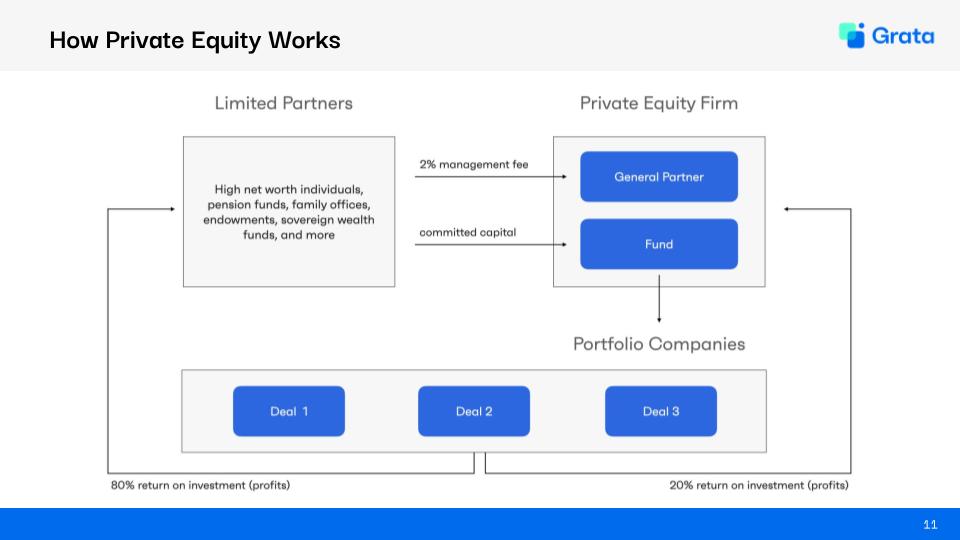As interest rates hit historic lows over the last 18 months, investors have increasingly sought new ways to maximize their returns.
Many of them are turning to alternative investments, like special purpose acquisition companies (SPACs), cryptocurrency, rare collectibles, private equity, and credit funds. With greater access to capital, private equity firms, in particular, are reshaping their deal sourcing strategies to discover better deals and increase returns for investors. To accomplish this, PE firms are embracing search funds, a shadow asset class that has been around for nearly 40 years but is now going mainstream.
Emerging from the Shadows: A Quick Primer on Search Funds
Search funds emerged as an investment vehicle in the 1980s primarily as a way for young entrepreneurs to quickly establish themselves, gain a CEO title, acquire a company and then guide it to a successful exit.
With search funds, an entrepreneur raises money to find and acquire an existing private company with solid financials. During the early stages of the fundraising process, the entrepreneur and their investors agree on the search parameters for a potential acquisition, which often includes criteria such as annual revenue growth, industry segment, EBITDA targets, profit margin, valuation, and liquidity potential in three to five years.
Search funds primarily target companies with between $5 and $30 million in revenue, and on average it takes 23 months to acquire a company, according to a May 2021 report from Stanford University’s Center for Entrepreneurial Studies (CES). Initial search capital of at least $400,000 is required to cover salary, benefits, and administrative expenses, along with additional investor capital to actually acquire the company, which can amount to millions of dollars.
To date, entrepreneurs have formed more than 542 search funds — a number that likely will grow in the coming years due to the significant benefits this shadow asset class can deliver for PE firms.
How PE Firms Can Win with Search Funds
There are three main advantages search funds offer PE firms: better returns, a greater competitive advantage, and more diversification.
Better Returns
The potential for huge returns is one of the many reasons PE firms should integrate search funds into their deal flow.
According to a 2020 CES analysis of 401 search funds, investors achieved a 32.6% rate of return with this asset class and a 5.5 times aggregate pre-tax return on their investment.
Previous studies also have shown search funds often outperform other asset classes within private equity, including buyout equity, growth equity, and venture capital. The most recent CES research indicates search funds delivered an 8.4 times return on investor capital compared to 1.8 times for growth equity and 1.9 times times for U.S. buyout equity. For U.S. venture capital, the internal rate of return (IRR) was 18.6% — about half the IRR for search funds over the same period.
These figures indicate search funds better position PE firms to improve the performance of their portfolios and produce significantly higher returns for investors.
Greater Competitive Advantage
Private equity buyers also have an advantage in the search fund space because they already come to these deals with capital ready to deploy, a proven framework for getting deals across the finish line, and a track record of trade sales, secondary buyouts, and initial public offerings (IPOs).
The biggest private equity firms can hire highly expensive, professional sourcers to find and buy one individual asset and act as the asset company’s CEO. Aside from a finder’s fee strategy, PE firms are often a more attractive buyer for a potential company in a competitive auction situation. Investment banks also may present PE firms with promising deals before other potential buyers, further optimizing their deal flow and search fund strategy by putting these firms in front of business owners who are primed and ready to sell. From there, a professional searcher can get started on due diligence to accelerate the acquisition process. PE firms are often able to pay a higher price to get a target acquisition and are better positioned to help these companies grow once they are part of their portfolio, because of economies of scale within their operations and their ability to uncover new growth opportunities and revenue models.
PE firms that get in early on these deals and contribute to search capital also benefit from pro-rata follow-on rights, which allows them to maintain their equity percentage through future funding rounds. They also receive a stepped-up basis —typically equal to 150% of their initial investment — during the acquisition financing round. This further increases returns once a PE firm is ready to seek liquidity for these assets.
Diversification
Diversification is another advantage for PE firms.
Search funds provide another deal sourcing mechanism outside of the traditional sourcing strategies PE firms often rely on, whether it’s using LinkedIn or an M&A platform.
PE firms can expand their investable universe and collaborate with entrepreneurs to find and grow acquired companies and usher them through a successful exit. Because these deal sizes are often smaller than the proprietary deals PE firms source through other avenues, these firms also can add more search fund investments to their portfolios and further diversify their holdings. This is a boon for investors, too, because they get more diversification within their portfolios and reduce some of the risks traditionally associated with private equity investments.
The Future of Search Funds
As investors continue to look for alternative asset classes, private equity firms also will explore new strategies to optimize how they source deals and improve portfolio performance.
Search funds are one avenue they can explore. However, like any asset class, search funds aren’t without risks. Even the most expensive, skilled searcher can’t guarantee an acquired company will be successful, an entrepreneur-turned-CEO may not perform in the way a PE firm expects, and it may take longer to get to a successful exit.
Still, there’s no reward without some measure of risk. Search funds often have been under appreciated within private equity, but they now provide an invaluable opportunity for PE firms. Flush with more investor capital, PE firms can leverage this shadow asset class to diversify their holdings, boost returns, and further cement their reputation with investors.











